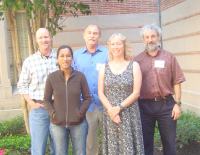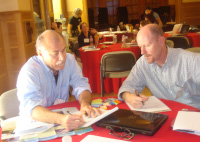| |  |
| COSEE-West Southern California
faculty members: Back row:
Christopher Lowe, Cal State Long
Beach, Sergio Sanudo Wilhelmy and Jed Fuhrman, USC. Front row: Aradhna Tripathi and Peggy Fong, UCLA |
The COSEE-West Faculty Graduate Student (FGSC) workshop held in April 2011 was conducted by COSEE-OS and COSEE-West staff at the University of Southern California (USC). There was a half-day professional development session for concept mapping training with scientists Dr. Jed Fuhrman and Dr. Sergio Sanudo-Wilhemy from USC, Dr. Peggy Fong and Dr. Aradhna Tripati from UCLA, and Dr. Chris Lowe from California State University Long Beach. COSEE-West staff (with assistance from COSEE-OS) selected 20 graduate students from USC, UCLA, and three California State Universities (19 graduate students in science and one graduate student in science education, who also worked as an informal educator) and matched them to scientists, based on Ocean Literacy and Climate Literacy concepts touched on by the scientists. Scientists presented the concept maps of their work to the graduate students and then worked with them to develop consensus concept maps. The scientists and graduate students discussed addressing misconceptions and building understanding. The graduate students then presented the consensus maps to 18 high school students and three teachers from Tessaract High School in Phoenix, Arizona, who provided feedback on the presentations and maps.
The scientists’ areas of research included paleoclimatology, fisheries ecology, marine ecology, biological oceanography, and analytical chemistry. None of the scientists had any familiarity with concept mapping. Of the 20 graduate students participating in the workshop, 45% of them had never used concept mapping, and one graduate student was using concept mapping in his current work.
 | |
USC Professor Sergio Sanudo Wilhelmy and Cal State Long Beach Professor Christopher Lowe present their
concept maps to each other | |
The scientists’ presentations to the graduate students were generally rated positively by the graduate students with regard to the big picture being clearly stated (71%), but less positive on other aspects, such as the appropriate use of jargon (59%), effectiveness of the concept map (44%), and having a memorable take home message (42%). Scientists gave higher ratings to other scientists' presentations, particularly on the appropriate use of jargon (83%) and effectiveness of the concept map (57%).
Feedback from the high school students on the graduate students’ presentations made to them was similar to the above. High school students felt there was a clearly stated big picture (67%), appropriate use of jargon (56%), effectiveness of the concept map (52%), and memorable take home message (42%). Graduate students also rated each other's presentations more highly on the big picture (78%), appropriate use of jargon (61%), effectiveness of the concept map (72%), and memorable take home message (69%).
Teacher Michelle Kramer from Tesseract High School, who brought her students to the concept mapping workshop, felt that it was highly beneficial to her teaching. “I can't begin to tell you how handy those map lessons have been,” she said. “Everywhere we go they've asked questions about cycles, microbes, etc. The students have been able to answer questions and understand the context because of those lessons. They really did learn and retain the information. In addition, it has tied together this experience.”
Concept Mapping Feedback
Scientists felt that attending the FGSC workshop was extremely beneficial, and that concept mapping would be very useful for their work. Their initial concept maps were often too complicated or had too much jargon, and they were forced to simplify their maps to make them more easily understood by the high school students. Learning how to create a concept map was more challenging than expected, but the scientists felt that the resulting maps would definitely be useful in distilling challenging concepts.
Nineteen of the 20 graduate students who participated felt that the FGSC workshop met their expectations, and were satisfied with the overall length (95%) and pacing (84%) of the workshop. Most graduate students felt that the workshop was very effective in helping them understand how concept mapping could be used to present ocean-climate science concepts (80%). Three-quarters of the graduate students felt that the Ocean-Climate Interactive online tool would be useful for their work or their presentations (70%), and that the Concept Map Builder would be useful for their work (70%) or their presentations (80%). They also felt that concept mapping was a helpful process to use for thinking through the content in the workshop (80%) and for sharing their ideas with scientists (60%).
Contributed by Patricia Kwon and COSEE-West Staff

